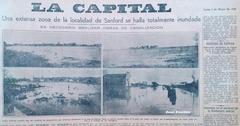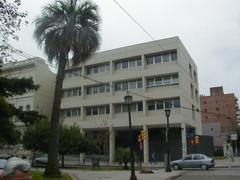
International Museum for Democracy Rosario: Visiting Hours, Tickets, and Historical Sites Guide
Date: 03/07/2025
Introduction
The International Museum for Democracy (Museo Internacional para la Democracia) in Rosario, Argentina, stands as a pioneering institution dedicated to the exploration and preservation of democratic values, history, and civic engagement. Located in the iconic Palacio Fuentes, this museum provides visitors with a comprehensive journey through Argentina’s democratic evolution and the broader global struggle for civil rights and freedoms. Whether you are a history enthusiast, student, or traveler, this guide offers everything you need to plan your visit—from historical context to practical visitor information and recommendations for nearby sites.
Table of Contents
- Introduction
- Historical Context of Democracy in Rosario and Argentina
- Foundation and Vision of the International Museum for Democracy
- Visitor Information: Hours, Tickets, and Accessibility
- Museum Collections and Educational Programs
- Visuals and Media Suggestions
- Nearby Rosario Historical Sites
- Frequently Asked Questions (FAQ)
- Conclusion and Recommendations
- References and Further Reading
Historical Context of Democracy in Rosario and Argentina
The Evolution of Democracy in Argentina
Argentina’s path to democracy has been marked by periods of both progress and repression. Following its independence in 1816, the country experienced cycles of democratic and authoritarian rule. The darkest chapter, known as the “Dirty War” (1976–1983), was characterized by state terror, censorship, and the disappearance of thousands of citizens. The restoration of democracy in 1983 under President Raúl Alfonsín marked a turning point, emphasizing human rights and the rule of law (Carnegie Council).
Rosario’s Role in Democratic Movements
Rosario, Argentina’s third-largest city, has played a pivotal role in the nation’s democratic journey. The city is renowned for its vibrant civic culture, political activism, and significant events such as the 1969 “Rosariazo”—a series of mass protests against military rule. Rosario’s tradition of student, labor, and human rights activism continues to shape Argentina’s democratic landscape (Wikipedia: Rosario).
Foundation and Vision of the International Museum for Democracy
Founding Principles and Mission
Founded in the mid-2010s by social entrepreneur Guillermo Whpei, the International Museum for Democracy is the world’s first private museum solely devoted to democracy’s history and challenges. Its mission is to foster critical reflection, education, and dialogue on democratic values, both locally and globally. The museum’s vision includes preserving historical memory, empowering civic engagement, and encouraging inclusive debate on contemporary democratic issues.
Location: Palacio Fuentes
The museum is housed in the historic Palacio Fuentes at Sarmiento 702, a landmark of early 20th-century architecture in central Rosario. The building’s ornate design and storied past enhance the visitor experience, blending cultural heritage with modern museography (WhichMuseum).
Visitor Information: Hours, Tickets, and Accessibility
Opening Hours
- Tuesday to Friday: 10:00 AM – 5:00 PM
- Saturday: 11:00 AM – 3:00 PM
- Sunday and Monday: Closed
- Note: Hours may vary for public holidays or special events. Always confirm on the official website before your visit.
Tickets and Admission
- General Admission: Free of charge
- Special Exhibitions/Events: Some may require prior registration or tickets; check the museum’s website for details.
- General entry does not require a ticket, but special programming may have specific requirements.
Accessibility
- Wheelchair Access: Some areas may be challenging due to the building’s historic nature; contact the museum in advance for details.
- Other Services: Audio guides and multilingual materials are available for select exhibitions.
- Inclusive Programs: Sensory-friendly hours and accommodations for visitors with disabilities are periodically offered.
Guided Tours and Languages
- Guided Tours: Offered primarily in Spanish; English tours may be available upon request or with advance booking.
- Written Materials: Brochures and exhibit information are available in Spanish and, to a lesser extent, in English.
Museum Collections and Educational Programs
Permanent and Temporary Exhibitions
Permanent Collection Highlights
- Argentina’s Democratic Journey: Original documents, photographs, and artifacts from pivotal periods, including the “Dirty War” and the return to democracy.
- Global Perspectives: Exhibits compare Argentina’s experience with other democratic movements worldwide.
- Voices of Resistance: Oral histories and testimonies from activists, survivors, and the Mothers of Plaza de Mayo.
- Democracy in Daily Life: Everyday objects and media illustrating how democracy has impacted Argentine society.
Notable Temporary Exhibitions
- “Democracy: Art and Resistance” (2024–2025): Over 100 works from Argentine, Spanish, and Portuguese artists reflect on art’s role in political transitions (Days of Art).
- “Never Again: Memory and Justice”: Photographs and documents related to state terrorism victims and trials.
- International Collaborations: Projects on women’s suffrage, indigenous rights, and democracy in the digital era.
Educational Initiatives
- Workshops and Lectures: Programs for students, educators, and the public promote critical thinking and civic participation.
- Youth Engagement: Interactive activities introduce concepts of citizenship and democratic rights to younger audiences.
- Community Dialogue: The museum hosts debates, forums, and commemorative events, especially during Argentina’s “Week of Memory” (Auschwitz Institute).
Visuals and Media Suggestions
- Photography: Non-flash photography is permitted in most areas. Check for restrictions in temporary exhibitions.
- Digital Content: High-quality images and virtual tours are available on the museum’s official website.
- SEO Tips: Use descriptive alt text for images, such as “International Museum for Democracy Rosario exterior” and “Museo Internacional para la Democracia exhibition artifacts.”
Nearby Rosario Historical Sites
Enhance your visit by exploring these nearby attractions:
- National Flag Memorial (Monumento a la Bandera): Rosario’s iconic landmark, just a short walk from the museum.
- Museum of Contemporary Art of Rosario: A showcase for modern and contemporary works.
- Museum of Memory: Focused on human rights and remembrance.
- Juan B. Castagnino Fine Arts Museum: A leading collection of Argentine art.
- Boulevard Oroño: Picturesque avenue lined with historic mansions.
Frequently Asked Questions (FAQ)
Q: What are the museum’s opening hours?
A: Tuesday to Friday, 10:00 AM–5:00 PM; Saturday 11:00 AM–3:00 PM; closed Sunday and Monday. Confirm on the official website before your visit.
Q: Is there an admission fee?
A: General admission is free. Some special exhibitions or events may require registration.
Q: Are guided tours available in English?
A: Most tours are in Spanish. English-language tours may be available on request or with advance booking.
Q: Is the museum accessible for people with disabilities?
A: Some areas of the historic building may be difficult to access. Contact the museum in advance for accommodation details.
Q: Can I take photographs inside the museum?
A: Photography is generally allowed without flash or tripods; restrictions may apply in some exhibitions.
Q: How do I get to the museum?
A: The museum is centrally located at Sarmiento 702 and is easily accessible by public transport, taxi, or on foot from downtown Rosario.
Conclusion and Recommendations
The International Museum for Democracy in Rosario offers an essential exploration of democratic history, rights, and the ongoing quest for social justice. With its rich collections, educational programs, and prime location in Palacio Fuentes, the museum provides a rewarding experience for all visitors. To make the most of your visit:
- Check the official website for current hours, events, and accessibility information.
- Consider extending your trip to include other Rosario historical sites.
- Use translation apps or arrange for a bilingual guide if you are not fluent in Spanish.
- Download the Audiala app for enhanced audio guides and interactive experiences.
- Stay informed about museum events and Rosario tourism by following official social media channels.
Engaging with the International Museum for Democracy is more than a visit—it is a chance to reflect on the lessons of history and participate in the ongoing story of democracy and human rights.
References and Further Reading
- International Museum for Democracy Official Listing
- Rosario Tourism Guide
- Visitor Tips for Argentina
- Wikipedia: Rosario
- Auschwitz Institute: Week of Memory in Argentina
- Days of Art: Democracy Art and Resistance Exhibition
- Carnegie Council: The Dirty War and Democracy in Argentina
- Official Museum Website: Museo Internacional para la Democracia







